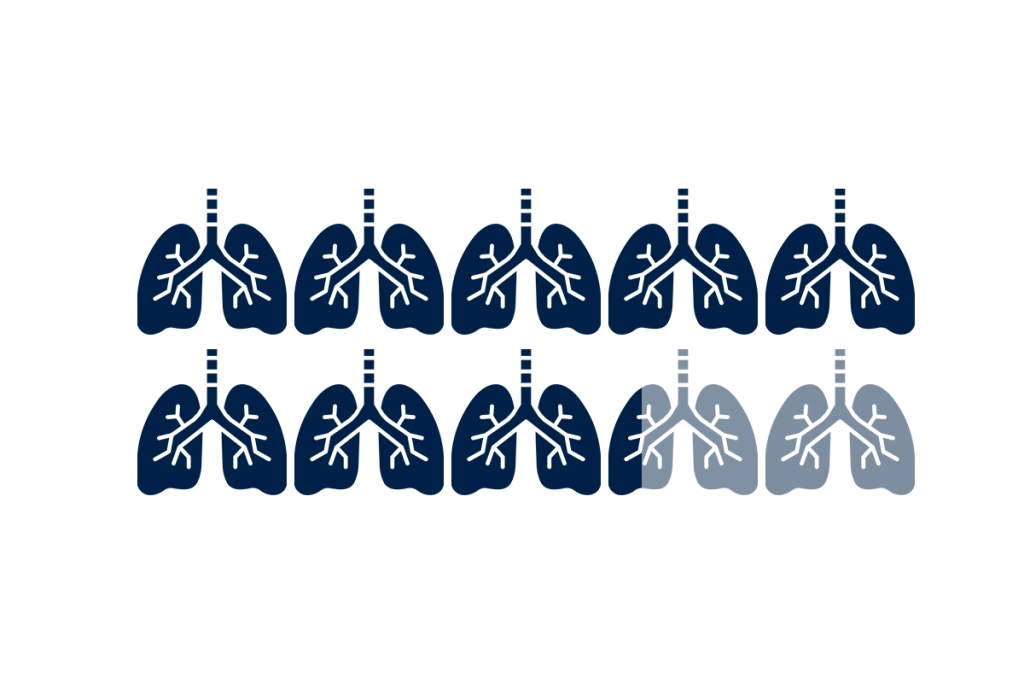LUNGClear
Blood Test for
Early Detection of
Lung Cancer
Lung cancer is the leading cause of cancer deaths
Lung cancer is the leading cause of cancer deaths and the most commonly diagnosed cancer in Asia and the rest of the world.1
Lung cancer is also the leading cause of cancer deaths in Southeast Asia.1
One of the main factors driving lung cancer mortality is the late-stage diagnosis of many cases.2
1. Global Cancer Observatory, International Agency for Research on Cancer, World Health Organization.
2. Caballero-Vázquez A, et al. Risk Factors for Short-Term Lung Cancer Survival. J Clin Med. 2021 Feb 1;10(3):519..
Early detection improves lung cancer survival
Early detection can reduce lung cancer deaths, as it increases the likelihood of successful treatment.3
Someone diagnosed with stage 1 lung cancer is about 13x more likely to survive five years post-diagnosis than someone diagnosed at stage 4.4
3. Lam, D. C.-L. et al, (2023). Lung Cancer Screening in Asia: An Expert Consensus Report. Journal of Thoracic Oncology, 18(10), 1303–1322
4. Cancer Research UK, Survival for lung cancer.
Your risk of developing lung cancer is increased if you:
Smoke or used to smoke cigarettes
Have second hand exposure to cigarette smoke
Have an immediate family member who has/had lung cancer
However, you can still develop lung cancer even without any of the above risk factors:
- About one-third of all lung cancer patients in East Asia have never smoked.5
- Among women in Asia with lung cancer, non-smokers outnumber smokers.3
5. Zhou, F., & Zhou, C. (2018). Lung cancer in never smokers—the East Asian experience. Translational Lung Cancer Research, 7(4), 450–463.
Current lung cancer screening practice
6. Screening for Lung Cancer, Division of Cancer Prevention and Control, US Centers for Disease Control and Prevention.
How does LUNGClear help with lung cancer detection?
LUNGClear is a convenient blood test that detects a molecular signature associated with lung cancer. It also avoids the risks of radiation exposure associated with LDCT scans.
The test reports a risk score, indicating whether you are at low, intermediate or high risk of having lung cancer at the time of testing.
The LUNGClear report will be assessed by your doctor, and he/she will propose the next course of action, if necessary.
7. In clinical validation studies conducted by Mirxes

Up to 83%
of stage 1
cancer cases detected7
LB-1336_r00
Do you have any questions about lung cancer or the LUNGClear test?
Early-stage lung cancer commonly does not cause symptoms. When it does, those symptoms are usually similar to other less serious illnesses, such as coughing, loss of appetite or chest discomfort.
An LDCT scan is a procedure that uses x-rays to take a series of images of areas inside your body while you are lying down. These images can be used to create 3D views of internal organs. It is commonly used for detecting lung cancer in persons who are at high risk, such as long-term heavy smokers.
LUNGClear is intended for healthy individuals aged 40 and above, who are not at high risk of lung cancer.
LUNGClear is a simple and convenient blood test in which about 5 mL of your blood is drawn into a tube and sent for analysis.
A report describing your risk score and risk category for having lung cancer at the time of testing will be sent to the ordering physician. He/she will go through the report with you, including whether further evaluation is advisable.

SOCIAL MEDIA
- Genomics
- Clinical Sequencing
- Discovery Genomics
- Cancer Screening
- GASTROClear for Patients
- GASTROClear for Medical Professionals
- LUNGClear
- Cancer Treatment Selection
- APEX Tissue
- COMPASS Tissue
- Infectious Diseases
- Fortitude 2.1
- Fortitude 3.0
- Fortitude Syndromic Panel
- CoVClear Mutation Panel
- Swab & Saliva Collection
- RNA Extraction Kit & Instruments